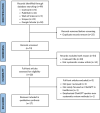Impact of large language model (ChatGPT) in healthcare: an umbrella review and evidence synthesis
- PMID: 40335969
- PMCID: PMC12057020
- DOI: 10.1186/s12929-025-01131-z
Impact of large language model (ChatGPT) in healthcare: an umbrella review and evidence synthesis
Abstract
Background: The emergence of Artificial Intelligence (AI), particularly Chat Generative Pre-Trained Transformer (ChatGPT), a Large Language Model (LLM), in healthcare promises to reshape patient care, clinical decision-making, and medical education. This review aims to synthesise research findings to consolidate the implications of ChatGPT integration in healthcare and identify research gaps.
Main body: The umbrella review was conducted following Preferred Reporting Items for Systematic Reviews and Meta-Analyses (PRISMA) guidelines. The Cochrane Library, PubMed, Scopus, Web of Science, and Google Scholar were searched from inception until February 2024. Due to the heterogeneity of the included studies, no quantitative analysis was performed. Instead, information was extracted, summarised, synthesised, and presented in a narrative form. Two reviewers undertook title, abstract, and full text screening independently. The methodological quality and overall rating of the included reviews were assessed using the A Measurement Tool to Assess systematic Reviews (AMSTAR-2) checklist. The review examined 17 studies, comprising 15 systematic reviews and 2 meta-analyses, on ChatGPT in healthcare, revealing diverse focuses. The AMSTAR-2 assessment identified 5 moderate and 12 low-quality reviews, with deficiencies like study design justification and funding source reporting. The most reported theme that emerged was ChatGPT's use in disease diagnosis or clinical decision-making. While 82.4% of studies focused on its general usage, 17.6% explored unique topics like its role in medical examinations and conducting systematic reviews. Among these, 52.9% targeted general healthcare, with 41.2% focusing on specific domains like radiology, neurosurgery, gastroenterology, public health dentistry, and ophthalmology. ChatGPT's use for manuscript review or writing was mentioned in 17.6% of reviews. Promising applications include enhancing patient care and clinical decision-making, though ethical, legal, and accuracy concerns require cautious integration.
Conclusion: We summarise the identified areas in reviews regarding ChatGPT's transformative impact in healthcare, highlighting patient care, decision-making, and medical education. Emphasising the importance of ethical regulations and the involvement of policymakers, we urge further investigation to ensure the reliability of ChatGPT and to promote trust in healthcare and research.
Keywords: ChatGPT; Large language models (LLMs); Consumer health; Evidence synthesis; Generative AI; Healthcare; Medical research; Medical education; Patient care; Reviews.
© 2025. The Author(s).
Conflict of interest statement
Declarations. Ethics approval and consent to participate: Not applicable. Consent for publication: Not applicable. Competing interests: The authors declare that they have no competing interests.
Figures
Similar articles
-
The Role of Large Language Models in Transforming Emergency Medicine: Scoping Review.JMIR Med Inform. 2024 May 10;12:e53787. doi: 10.2196/53787. JMIR Med Inform. 2024. PMID: 38728687 Free PMC article.
-
Advancements of AI in healthcare: a comprehensive review of ChatGPT's applications and challenges.J Pak Med Assoc. 2025 Jan;75(1):78-83. doi: 10.47391/JPMA.11173. J Pak Med Assoc. 2025. PMID: 39828833 Review.
-
A Systematic Review of ChatGPT and Other Conversational Large Language Models in Healthcare.medRxiv [Preprint]. 2024 Apr 27:2024.04.26.24306390. doi: 10.1101/2024.04.26.24306390. medRxiv. 2024. Update in: J Med Internet Res. 2024 Nov 7;26:e22769. doi: 10.2196/22769. PMID: 38712148 Free PMC article. Updated. Preprint.
-
Large language models for conducting systematic reviews: on the rise, but not yet ready for use-a scoping review.J Clin Epidemiol. 2025 May;181:111746. doi: 10.1016/j.jclinepi.2025.111746. Epub 2025 Feb 26. J Clin Epidemiol. 2025. PMID: 40021099
-
A scoping review of ChatGPT's role in healthcare education and research.Nurse Educ Today. 2024 Apr;135:106121. doi: 10.1016/j.nedt.2024.106121. Epub 2024 Feb 6. Nurse Educ Today. 2024. PMID: 38340639
Cited by
-
Gender Differences in the Use of ChatGPT as Generative Artificial Intelligence for Clinical Research and Decision-Making in Occupational Medicine.Healthcare (Basel). 2025 Jun 11;13(12):1394. doi: 10.3390/healthcare13121394. Healthcare (Basel). 2025. PMID: 40565419 Free PMC article.
-
The Artificial Intelligence-Assisted Diagnosis of Skeletal Dysplasias in Pediatric Patients: A Comparative Benchmark Study of Large Language Models and a Clinical Expert Group.Genes (Basel). 2025 Jun 28;16(7):762. doi: 10.3390/genes16070762. Genes (Basel). 2025. PMID: 40725418 Free PMC article.
-
Machine Learning-Powered Smart Healthcare Systems in the Era of Big Data: Applications, Diagnostic Insights, Challenges, and Ethical Implications.Diagnostics (Basel). 2025 Jul 30;15(15):1914. doi: 10.3390/diagnostics15151914. Diagnostics (Basel). 2025. PMID: 40804880 Free PMC article. Review.
References
-
- Ashraf H, Ashfaq H. The role of ChatGPT in medical research: progress and limitations. Ann Biomed Eng. 2023. 10.1007/s10439-023-03311-0. - PubMed
-
- Bečulić H, Begagić E, Skomorac R, Mašović A, Selimović E, Pojskić M. 2024. ChatGPT’s contributions to the evolution of neurosurgical practice and education: A systematic review of benefits, concerns and limitations. Medicinski Glasnik Ljekarske Komore Zenicko-Dobojskog Kantona. 10.17392/1661-23 - PubMed
-
- Bera K, O’Connor G, Jiang S, Tirumani SH, Ramaiya N. Analysis of ChatGPT publications in radiology: literature so far. Curr Probl Diagn Radiol. 2024;53(2):215–25. 10.1067/j.cpradiol.2023.10.013. - PubMed
-
- Bugaj M, Kliestik T, Lăzăroiu G. Generative artificial intelligence-based diagnostic algorithms in disease risk detection, in personalized and targeted healthcare procedures, and in patient care safety and quality. Contemp Read Law Soc Justice. 2023;15(1):9–26.
Publication types
MeSH terms
LinkOut - more resources
Full Text Sources
Medical


